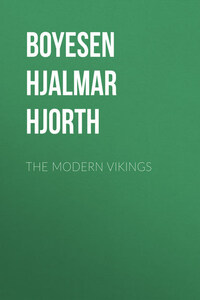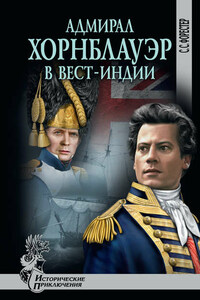Tharald and his brother Anders were bathing one day in the lake. The water was deliciously warm, and the two boys lay quietly floating on their backs, paddling gently with their hands. All of a sudden Tharald gave a scream. A big trout leaped into the air, and almost in the same instant a black, shiny head rose out of the water right between his knees. The trout, in its descent, gave him a slap of its slimy tail across his face. The black head stared out at him, for a moment, with an air of surprise, then dived noiselessly into the deep.
Anders hurried to shore as rapidly as arms and legs would propel him.
“It was the sea-serpent,” said he.
He was so frightened that he grew almost numb; his breath stuck in his throat, and the blood throbbed in his ears.
“Oh, you sillibub!” shouted his brother after him, “it was an otter chasing a salmon-trout. The trout will always leap, when chased.”
He had scarcely spoken when, but a few rods from Anders, appeared the black, shiny head again, this time with the trout in its mouth.
“He has his lair somewhere around here,” said Tharald; “let us watch him, and see where he is going.”
The otter was nearing the shore. He swam rapidly, with a slightly undulating motion of the body, so that, at a distance, he might well have been mistaken for a large water-snake. When he had reached the shore, he dragged the fish up on the sand, spied cautiously about him, to see if he was watched, and again seizing the trout, slid into the underbrush. There was something so delightfully wild and wary about it that the boys felt the hunter’s passion aroused in them, and they could scarcely take the time to fling on their clothes before starting in pursuit. Like Indians, they crept on hands and feet over the mossy ground, bent aside the bushes, and peered cautiously between the leaves.
“Sh – sh – sh! we are on the track,” whispered Tharald, stooping to smell the moss. “He has been here within a minute.”
“Here is a drop of fish-blood,” answered Anders, pointing to a twig, over which the fish had evidently been dragged.
“Serves him right, the rascal,” murmured his elder brother.
“If we haven’t got him now, my name is not Anders,” whispered the younger.
They had advanced about fifty rods from the water, when their attention was arrested by two faint tracks among the stones – so faint, indeed, that no eyes but those of a hunter would have discovered them. A strange pungent odor, as of something wild, pervaded the air; the whirring of the crickets in the tree-tops seemed hushed and timid, and little silent birds hopped about in the elder-bushes as if afraid to make a noise.
The boys lay down flat on the ground, and following the two tracks, discovered that they converged toward a frowsy-looking juniper-bush which grew among the roots of a big old pine. Very cautiously they bent the bush aside.
What was that? There stood the old otter, tearing away at his trout, and three of the prettiest little black things your eyes ever fell upon were gambolling about him, picking up bits of the fish, and slinging them about in their efforts to swallow.
The boys gave a cry of delight. But the otter – what do you think he did? He showed a set of very ugly teeth, and spat like an angry cat. It was evidently not advisable to molest him with bare hands.








